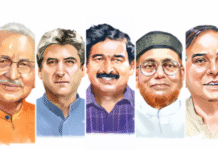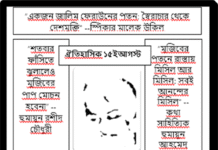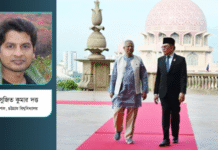By Mohammed Mian Soomro
In a few days an innocent man—Salauddin Quader Chowdhury—will be executed in Bangladesh unless the country’s Honorable Supreme Court grants an appeal to allow exculpatory evidence to be presented. How do I know that he is innocent? Because I am a witness who can prove that he was out of the country when his alleged crimes were committed. But unfortunately my testimony has not been considered.
Chowdhury is a leader in the opposition Bangladesh Nationalist Party, a six-time member of Parliament, a former cabinet minister, and adviser to a former prime minister. In 2010, security forces suddenly and inexplicably arrested Chowdhury under the suspicion that he was involved in an arson attack on a car during a political demonstration against the government. There was no outstanding warrant against him at the time.
ADVERTISEMENT
Even members of the current ruling party, the Awami League, stated that the arrest was suspicious for taking place on December 16, a Bangladesh National holiday. Immediately after his arrest, Chowdhury was imprisoned and tortured for five days (a fact confirmed by Amnesty International and the United Nations).
Chowdhury has been imprisoned ever since. In October 2013, he was brought before the International Crimes Tribunal (ICT) in Bangladesh, which issued a death sentence against him after a hasty trial.
The former United States Ambassador-at-Large for Global Justice, Stephen Rapp, visited Bangladesh several times and on behalf of the U.S. urged that the government and the ICT to make changes to comply with universal fair trial standards. This position was echoed by many international organizations including Human Rights Watch, the Office of the United Nations High Commissioner for Human Rights, the International Center for Transitional Justice and the International Commission of Jurists.
According to the above organizations, the ICT is a domestic court that does not apply the rules of jurisprudence of Bangladesh, nor does it comply with international law. Anyone who is accused of a crime in this court automatically loses their rights to a fair trial. The tribunal sets its own rules and standards for evidence, which include hearsay without corroboration.
In December 2012 The Economist published an article exposing the Bangladeshi government’s interference in the Tribunal’s decisions. Subsequently the judge resigned midtrial, although it still led to death sentence for the opposition party members despite the fact that none of the judges had heard the case in its entirety.
In Chowdhury’s case the ICT sentenced him to death two years ago for nine offenses that took place in Bangladesh in April and July 1971, during the unrest in those days. Crucially, during the said period, Chowdhury was in Pakistan as a student at Punjab University.
During the trial, Chowdhury was allowed only four defense witnesses while the tribunal was allowed 41. The tribunal did not allow several reliable crucial defense witnesses to testify that Chowdhury was in Pakistan during that period.
Six of the witnesses — including myself, a former U.S. ambassador, and a former member of the Pakistan legislative assembly and a former Federal minister — live outside of Bangladesh.
Here is what I gave as an affidavit under oath:
I have known Salauddin Chowdhury, since January 1964, when we attended school in Bahawalpur West Pakistan. Salauddin Chowdhury is charged with crimes that are said to be committed in April and July 1971 in East Pakistan (now Bangladesh). Whereas I met him regularly in Karachi in April 1971, before he joined university in Lahore. I also visited him while he lived in Lahore most of the time until August. Based on what I saw in 1971, I believe that the conviction of Salauddin Chowdhury is a grave injustice. I remain ready to testify in court under oath at any time.
I was disappointed to note that on technical grounds the Honorable Supreme Court dismissed my sworn affidavit and decided to uphold the conviction. But it is not just my word, there are several other reliable witnesses who can testify that Chowdhury was outside Bangladesh at the time the crimes were committed, however their sworn statements were also not considered.
Why not hear what the witnesses have to say? Is this not more than a reasonable doubt that Chowdhury did not commit the crimes?
On November 2, the Honorable Supreme Court will review Salauddin Chowdhury’s sentence and his petition to allow written affidavits from eight witnesses. If the court does not allow the testimony, it will most likely order Chowdhury to death by hanging, an irreversible perversion of due process and justice, which is a violation of universally accepted basic human rights.
Chowdhury could not have committed these crimes in April and June 1971 – I know. I am a personal witness that he was out of the country (now Bangladesh).
The evidence of the case can only lead to one conclusion: Chowdhury is innocent and Bangladesh’s Honorable Supreme Court must dismiss the charges or allow a fair trial.
For the future of her country, Prime Minister Sheik Hasina must allow a fair trial for Chowdhury and disband the International Crimes Tribunal. The U.S. Government joined by the international community must take immediate action to address these injustices before it is too late to save Salauddin Quader Chowdhury.
Soomro is the former prime minister (2007—2008) and president (2008) of Pakistan.
Source: TheHill.com









